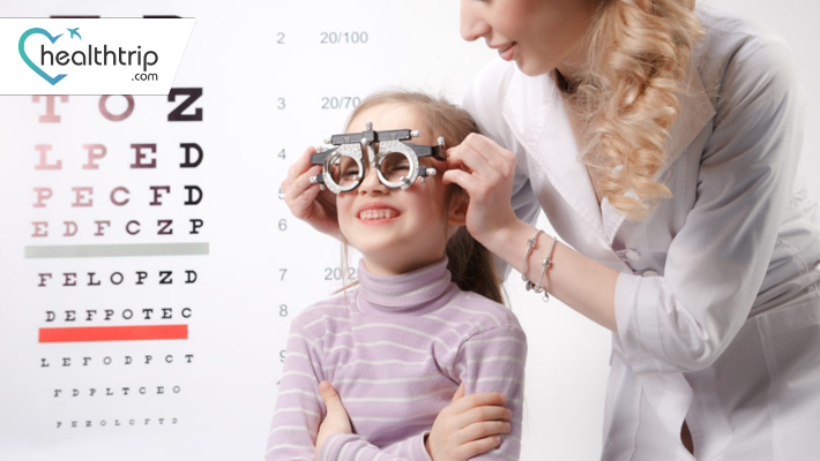
Understanding the Importance of Regular Eye Check-ups
25 Aug, 2023
 Rajwant Singh
Rajwant SinghOur Eyes: Windows to the World and Our Health
Introduction:
Our eyes are one of the most remarkable and intricate organs in our body, allowing us to experience the world around us in vivid detail. Yet, despite their importance, we often take our eyes for granted, neglecting their well-being until a problem arises. Regular eye check-ups play a vital role in maintaining good eye health, preventing vision problems, and detecting potential issues early. In this article, we will delve into the significance of regular eye check-ups and why they should be an integral part of your overall healthcare routine.
The Window to Your Health:
Detecting Underlying Health Conditions
Transform Your Beauty, Boost Your Confidence
Find the right cosmetic procedure for your needs.

We specialize in a wide range of cosmetic procedures

Our eyes are not only a window to the world; they are also a window to our overall health. During an eye examination, eye care professionals can detect signs of various underlying health conditions that might otherwise go unnoticed. Conditions such as diabetes, hypertension, cardiovascular disease, and even certain types of cancer can be detected or indicated through changes in the eyes. Thus, a regular eye check-up can serve as an essential preventive measure for a wide range of health concerns.
Preventing Vision Problems:
Early Detection for Gradual Conditions
Many eye conditions and vision problems develop gradually over time, often without noticeable symptoms in their early stages. By the time symptoms become apparent, the condition may have progressed significantly. Regular eye check-ups allow eye care professionals to monitor your eye health and detect issues at their earliest stages. This early intervention can prevent or slow down the progression of conditions such as glaucoma, macular degeneration, and cataracts, preserving your vision and quality of life.
Prescription Updates:
Ensuring Clear and Comfortable Vision
If you wear glasses or contact lenses, regular eye check-ups are crucial for ensuring that your prescription is up-to-date. Over time, your vision can change, and an outdated prescription can lead to discomfort, eye strain, and even headaches. By having your eyes examined regularly, your eye care professional can accurately assess your vision and update your prescription as needed, allowing you to see clearly and comfortably.
Children's Eye Health:
Impact on Learning and Development
Most popular procedures in
Total Hip Replacemen
Upto 80% off
90% Rated
Satisfactory

Total Hip Replacemen
Upto 80% off
90% Rated
Satisfactory

Breast Cancer Surger
Upto 80% off
90% Rated
Satisfactory

Total Knee Replaceme
Upto 80% off
90% Rated
Satisfactory

Total Knee Replaceme
Upto 80% off
90% Rated
Satisfactory

Children's eye health is a matter of special concern, as undetected vision problems can impact their learning, development, and overall well-being. Regular eye check-ups for children are essential to identify any vision issues early. Conditions such as amblyopia (lazy eye), strabismus (crossed eyes), and refractive errors can be effectively treated if detected during childhood. Early intervention can set the foundation for good vision and eye health throughout their lives.
Digital Eye Strain:
Addressing Screen-related Discomfort
In today's digital age, we spend a significant amount of time in front of screens, whether it's computers, smartphones, or tablets. Prolonged screen time can lead to digital eye strain, characterized by symptoms like dry eyes, blurry vision, and headaches. Regular eye check-ups can help detect and address digital eye strain, providing guidance on proper screen use and recommending strategies to minimize discomfort.
Personalized Care:
Tailoring Recommendations for Individuals
Each individual's eye health is unique, and factors such as age, family history, and lifestyle play a role in determining your risk for various eye conditions. Regular eye check-ups provide an opportunity for personalized care, as your eye care professional can assess your specific risk factors and tailor their recommendations accordingly. Whether it's managing dry eyes, preventing age-related conditions, or addressing specific concerns, personalized care ensures that your eye health needs are met.
Raising Awareness:
Promoting a Culture of Proactive Eye Care
Regular eye check-ups also contribute to raising awareness about the importance of eye health. By prioritizing your own eye health and sharing your experiences with family and friends, you contribute to a culture of proactive eye care. This, in turn, encourages others to make regular eye check-ups a priority, leading to improved overall eye health within the community.
What to Expect During an Eye Check-up:
Comprehensive Tests for Eye Health and Vision
An eye check-up involves a series of comprehensive tests and evaluations to assess your eye health and vision. These tests may include:
1. Visual Acuity Test: This test measures your ability to see details at various distances, usually using an eye chart.
2. Refraction Test: If you require corrective lenses, this test determines the exact prescription you need.
3. Eye Health Evaluation: This involves examining the various structures of the eye, including the cornea, lens, retina, and optic nerve, using specialised instruments.
4. Intraocular Pressure Measurement: This test checks for glaucoma by measuring the pressure inside your eyes.
5. Dilation: Your pupils may be dilated to allow the eye care professional a better view of the back of your eye.
6. Colour Vision Test: This assesses your ability to differentiate between colors accurately.
7. Peripheral Vision Test: This test checks your side (peripheral) vision to detect any blind spots.
How can we help with the treatment?
If you're on the lookout for treatment in India, Thailand, Singapore, Malaysia, UAE, and Turkey, let Healthtrip be your compass. We will serve as your guide throughout your medical treatment. We'll be by your side, in person, even before your medical journey commences. The following will be provided to you:
Connect with renowned doctors from a network spanning 35+ countries and access the world's largest health travel platform.
Collaboration with 335+ top hospitals , including Fortis and Medanta.
Comprehensive treatments from Neuro to Cardiac to Transplants, Aesthetics, and Wellness.
Post-treatment care and assistance.
Teleconsultations at $1/minute with leading surgeons.
Trusted by 44,000+ patients for appointments, travel, visa, and forex assistance.
Access top treatments and packages, such as Angiograms and many more.
Gain insights from genuine patient experiences and testimonials.
Stay updated with our medical blog.
24/7 unwavering support, from hospital formalities to travel arrangements or emergencies.
Pre-scheduled specialist appointments.
Prompt emergency assistance, ensuring safety.
Our success stories
Conclusion:
Regular eye check-ups are a proactive step towards maintaining good eye health and overall well-being. They offer the opportunity to prevent, detect, and address a range of eye conditions and health concerns. Just as you prioritize your physical health with regular medical check-ups, incorporating regular eye examinations into your healthcare routine is essential. Remember, your eyes deserve the same attention and care you dedicate to the rest of your body. By staying vigilant about your eye health and scheduling regular check-ups, you can enjoy clear vision and a lifetime of vibrant experiences.
Wellness Treatment
Give yourself the time to relax
Lowest Prices Guaranteed!

Lowest Prices Guaranteed!